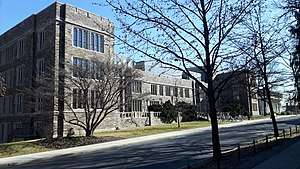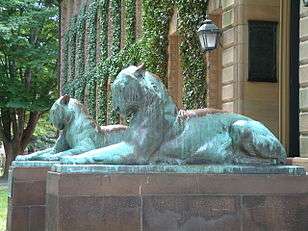Princeton University Department of Economics
The Princeton University Department of Economics is an academic department of Princeton University, an Ivy League institution in Princeton, New Jersey. The department is one of the most premier institutions for the study of economics. It offers undergraduate A.B. degrees as well as graduate Ph.D. degrees. It is considered one of the "big five" schools in the field along with the faculties at the University of Chicago, Harvard University, Stanford University, and MIT.[3] According to the 2018 U.S. News & World Report, the department ranks as No. 1 in the field of economics.[4]
 The Julis Romo Rabinowitz Building at Princeton University, home to the Department of Economics | |
| Type | Private |
|---|---|
| Established | 1913 |
Parent institution | Princeton University |
Academic staff | 65 full-time faculty members[1] |
| Students | Approximately 300+ undergraduate students and 141 graduate students[2] |
| Location | Princeton, New Jersey, United States |
| Website | economics |
The department is located in the Julis Romo Rabinowitz Building & Louis A. Simpson International Building, formerly 20 Washington Road, which also houses the Princeton Institute for International and Regional Studies, the Bendheim Center for Finance, the Center for Health and Wellbeing, and the Julis-Rabinowitz Center for Public Policy and Finance.[5] It is also home to the Industrial Relations Library.
History
Since the university's founding in 1746, many courses in the social sciences, including history and politics, were taught in the department of Jurisprudence and Political Economy. Coursework specifically in political economy became available in 1819. When Woodrow Wilson became a professor in 1890, additional courses were added to the curriculum, including the History of Political Economy. By 1913, the department became independent from history and politics, forming the Department of Economics and Social Institutions.[6]
Academics
The undergraduate program is one of the most prestigious programs for the study of economics in the country and in the world. Economics is the most popular concentration (Princeton's version of an academic major) at the undergraduate level.[7] Because the university does not have a business school, the economics concentration attracts many students who are interested in careers in investment banking, management consulting, finance, technology, and more.[8] The curriculum itself is theoretical in nature, requiring students complete quantitative courses up to multivariate calculus.[9] In partnership with the Bendheim Center for Finance, the department also offers an Undergraduate Finance Certificate.[10]
The graduate program in economics trains Ph.D. students for careers in academia, government, and industry. It receives approximately 800 applications for a class of 20 to 25 students who come from over 30 different countries around the world.[11] The program has numerous fields of specialization and has been particularly strong in the areas of Macroeconomics, Industrial Relations, and International Finance.[12][13] Graduate students who pursue academic careers have historically had placement records at some of the world's leading universities including Harvard, Yale, MIT, and Cornell.[14]
The department also oversees a number of centers and initiatives, including:[15]
Dial Lodge | |
|---|---|
Home to the Bendheim Center for Finance in Princeton, NJ |
- Bendheim Center for Finance
- The Benjamin H. Griswold III, Class of 1933, Center for Economic Policy Studies
- The Gregory C. Chow Econometric Research Program
- Julis-Rabinowitz Center for Public Policy and Finance
- Center for Health and Wellbeing
- William S. Dietrich II Economic Theory Center
- Industrial Relations Section
- International Economics Section
- Office of Population Research
- Political Economy Program
- Princeton Experimental Laboratory for the Social Sciences (PExL)
- Research Program in Development Studies
- The Gregory C. and Paula K. Chow Macroeconomic Research Program
- Louis A. Simpson Center for the Study of Macroeconomics
Rankings
National Rankings
The 2018 U.S. News & World Report places the department as No. 1 in the field of Economics, tied with Harvard University, Massachusetts Institute of Technology, Stanford University, University of California Berkeley, and Yale University.[16] The National Research Council's rankings place the university at No. 2 in the S-Rank (Scholars Rank) and No. 2 in the Research Rank.[17]
International Rankings
In the 2018 Q.S. World University Rankings, the department places as No. 3 in the world in the fields of Economics and Econometrics.[18] The 2018 Times Higher Education World University Rankings ranks the department as No. 7 globally.[19] It has been ranked by RePEc among the top ten economics Departments in the world.[20]
Notable faculty
Faculty members who have won the Nobel Memorial Prize in Economic Sciences include:[21]
- Arthur Lewis, James Madison Professor of Political Economy, 1979
- John Forbes Nash Jr., Senior Research Mathematician, 1994
- Eric Maskin, Visiting lecturer with the rank of professor of economics, 2007
- Paul Krugman, Professor of economics and international affairs, 2000
- Thomas Sargent, Visiting professor of economics, 2011
- Christopher Sims, Harold B. Helms Professor of Economics, 2011
- Angus Deaton, Dwight D. Eisenhower Professor of Economics and International Affairs, 2015
Former faculty members include Ben Bernanke, who was a Professor of Economics prior to serving as Chairman of the Federal Reserve; Professor Alan Blinder served on Bill Clinton's Council of Economic Advisers and previously served as Vice Chairman of the Federal Reserve; John Kenneth Galbraith, a leading academic on post-Keynesian economics; and Uwe Reinhardt, a scholar on health care economics and Medicare.
Other notably faculty members include:
- Mark Aguiar
- Orley Ashenfelter
- Markus Brunnermeier
- Roland Benabou
- Alan Blinder
- Leah Platt Boustan
- Markus Brunnermeier
- Anne Case
- Janet M. Currie
- Henry Farber
- Mikhail Golosov
- Gene Grossman
- Faruk Gül
- Kate Ho
- Bo E. Honoré
- Nobuhiro Kiyotaki
- Henrik Kleven
- Ilyana Kuziemko
- Alexandre Mas
- Atif Mian
- Wolfgang Pesendorfer
- Stephen J. Redding
- Richard Rogerson
- Esteban Rossi-Hansberg
- Cecilia Rouse
- Harold Tafler Shapiro
- Christopher A. Sims
- Mark W. Watson
- Wei Xiong
- Leeat Yariv
References
- "Faculty". Princeton University Department of Economics.
- "Graduate Student Directory". Princeton University Department of Economics.
- Roessler, Christian. "Applying for Admission to Economics PhD Programs in the United States". University of Rochester.
- "Economics". U.S. News and World Report.
- "Facilities". Princeton University.
- Leitch, Alexander. "The Department of Economics". A Princeton Companion. Archived from the original on 2016-03-05. Retrieved 2018-08-23.
- "The 3 most popular majors at every Ivy League school". Business Insider.
- "Undergraduate Program". Princeton University Department of Economics.
- "Requirements". Princeton University Department of Economics.
- "Finance Certificate". Princeton University Department of Economics.
- "The Ph.D. Program". Princeton University Department of Economics.
- Leitch, Alexander. "Industrial Relations". A Princeton Companion.
- Leitch, Alexander. "International Finance". A Princeton Companion.
- "Placement". Princeton University Department of Economics.
- "Centers and Programs". Princeton University Department of Economics.
- "Economics". U.S. News and World Report.
- "Doctoral Programs by the Numbers". The Chronicle of Higher Education.
- "QS world university rankings 2018: economics and econometrics". The Guardian.
- "World University Rankings 2018". Times Higher Education.
- "Top 10% Economic Institutions, as of July 2019". RePEc.
- "Nobel Prize, Economics". Princeton University.
External links
See also
- MIT Department of Economics
- Chicago School of Economics
- Paris School of Economics
- London School of Economics
- University of Pennsylvania Economics Department
- University of Rochester Economics Department
